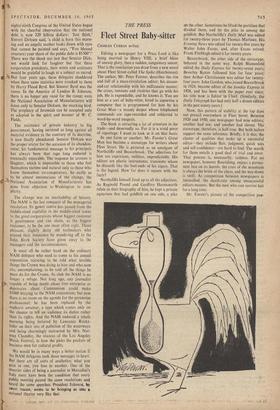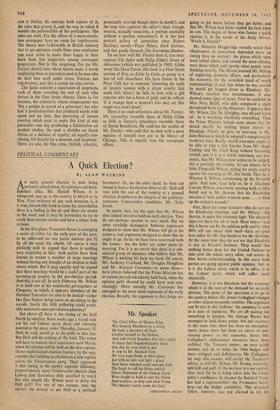THE PRESS
Fleet Street Baby-sitter
CHARLES CURRAN writes:
Editing a newspaper for a Press Lord is,like being married to Henry VIII; a brief blaze of uneasy glory, then a sudden, sanguinary sunset. That is the conclusion you draw from a new novel about Fleet Street called The Spike (Hutchinson). The author, Mr. Peter Forster, describes the rise and fall of a mass-circulation editor; his mouse- and-cat relationship with his millionaire master; the crises, tensions and rivalries that go with his job. He is expendable, and he knows it. You see him as a sort of baby-sitter, hired to supervise a computer that is programmed for him by his Great Man—a moody despot whose telephoned commands are tape-recorded and subjected to word-by-word exegesis.
The book is attracting a lot of attention in the trade—and deservedly so. For it is a vivid piece of reportage. I want to look at it on that basis.
In one form or another, Mr. Forster's Great Man has become a stereotype for writers about Fleet Street. He is pictured as an amalgam of Northcliffe and Beaverbrook. The adjectives for him are capricious, ruthless, unpredictable. His editors are plastic instruments, transients whom he discards like the butt-ends of his cigars. That is the legend. How far does it square with the facts?
Northcliffe himself lived up to all the adjectives. As Reginald Pound and Geoffrey Harmsworth relate in their biography of him, he kept a private aquarium that had goldfish on one side, a pike on the other. Sometimes he lifted the partition that divided them, and let the pike in among the goldfish. But Northcliffe's Daily Mail was edited for twenty-three years by Thomas Marlowe. His Evening News was edited for twenty-five years by Walter John Evans; and, after Evans retired, Frank FitzHugh edited it for twenty years.
Beaverbrook, the other side of the stereotype, behaved in the same way. Ralph Blumenfeld edited the Daily Express for twenty-seven years; Beverley Baxter followed him for four years; then Arthur Christiansen was editor for twenty- four years. John Gordon, who joined Beaverbrook in 1924, became editor of the Sunday Express in 1928, and has been with the paper ever since; his title now is Editor in Chief. (Similarly, the Daily Telegraph has had only half a dozen editors in the past ninety years.)
Now, this pattern of stability at the top does not prevail everywhere in Fleet Street. Between 1920 and 1950, one newspaper had nine editors; another had ten; and another had eleven. The stereotype, therefore, is half-true. But both halves support the same inference. Briefly, it is this; the cluster of qualities that make up a successful editor—they include flair, judgment, quick wits and self-confidence—are hard to find. The search for them entails a good deal of trial and error. That process is, necessarily, ruthless. For no newspaper, however flourishing, enjoys a perma- nent lien on its laurels; the crest of the mountain is always the brink of the abyss, and the way down is swift. As competition between newspapers is intensified, the death-rate among unsuccessful editors mounts. But the men who can survive last for a long time.
Mr. Forster's picture of the competitive pro- cess is lifelike. He conveys both aspects• of it; the rules that govern it, and the way in which it moulds the personalities of the participants. The rules are stark. For the offices of a mass-circula- tion newspaper have no room for togetherness. The theory now fashionable in British industry that to get optimum results from your employees you must strive to make them happy in their work finds few supporters among newspaper proprietors. Nor is this surprising. For (as Mr. Forster shows) men whose talents make it worth employing them as journalists tend to be men who do their best work under stress. Tension, not togetherness, acts like a catnip on sales curves.
The Spike contains a succession of snapshots, each of them revealing the sort of man who thrives in the Fleet Street climate. There is, for instance, the columnist, whose temperament was 'like a grudge in search of a grievance; but who had 'a professionalism that produced words with speed and on time, that mustering of instant emotion which went to make this kind of star journalist—one day producing a fulmination on modern clothes, the next a diatribe on South Africa or a defence of royalty; all equally con- vincing, felt fiercely for a moment, and forgotten.' There are also the film critic (`leftish, sybaritic, perpetually worried though never in doubt'); and the man who captures the editor's chair ('tough, amoral, sexually voracious, a puritan mentality without a puritan conscience'). It is the best portrait gallery of journalism since Robert Harling's novels—Paper Palace, Dark Saviour, and that gaudy firework The Enormous Shadow.
To see how well Mr. Forster does it, you must contrast The Spike with Philip Gibbs's Street of Adventure (which was published in 1909). Gibbs wrote like Dean Farrar. His book is a Fleet Street version of Eric, or Little by Little, as gooey as a box 'of soft chocolates. His hero listens in the Press Club bar to someone 'dissecting the souls of Society women with a clever cruelty that made him shiver'; he falls in love with a girl reporter who has a heart of gold, and he reflects 'it is strange how a woman's kiss may act like magic on a man's heart.'
There is no such artlessness about Mr. Forster. His journalists resemble those of Philip Gibbs as little as Farrar's schoolboys resemble those of David Benedictus.' He confirms the verdict of Mr. Dooley—who said that no man with a poor opinion of himself ever got to be Mayor of Chicago. This is equally true for newspaper offices.







































 Previous page
Previous page